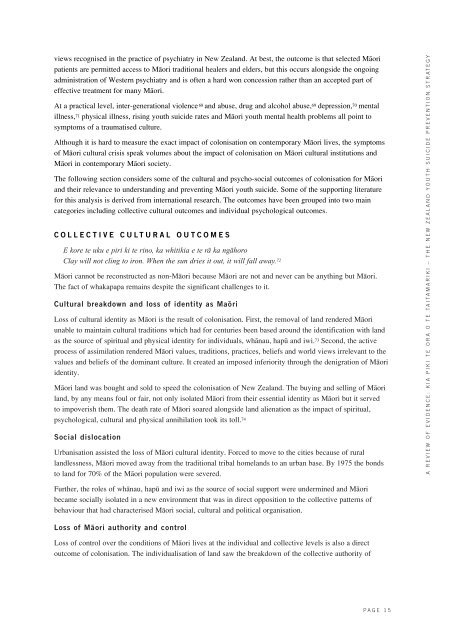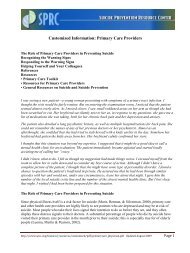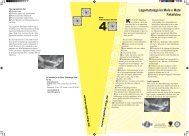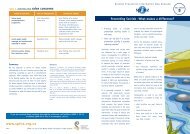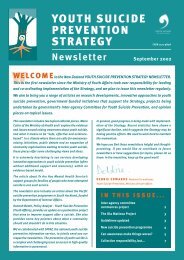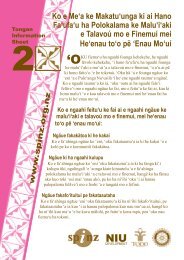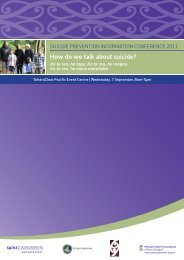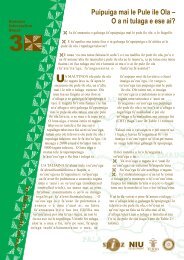A background document to support Kia Piki Te Ora O Te ... - SPINZ
A background document to support Kia Piki Te Ora O Te ... - SPINZ
A background document to support Kia Piki Te Ora O Te ... - SPINZ
Create successful ePaper yourself
Turn your PDF publications into a flip-book with our unique Google optimized e-Paper software.
views recognised in the practice of psychiatry in New Zealand. At best, the outcome is that selected Mäori<br />
patients are permitted access <strong>to</strong> Mäori traditional healers and elders, but this occurs alongside the ongoing<br />
administration of Western psychiatry and is often a hard won concession rather than an accepted part of<br />
effective treatment for many Mäori.<br />
At a practical level, inter-generational violence 68 and abuse, drug and alcohol abuse, 69 depression, 70 mental<br />
illness, 71 physical illness, rising youth suicide rates and Mäori youth mental health problems all point <strong>to</strong><br />
symp<strong>to</strong>ms of a traumatised culture.<br />
Although it is hard <strong>to</strong> measure the exact impact of colonisation on contemporary Mäori lives, the symp<strong>to</strong>ms<br />
of Mäori cultural crisis speak volumes about the impact of colonisation on Mäori cultural institutions and<br />
Mäori in contemporary Mäori society.<br />
The following section considers some of the cultural and psycho-social outcomes of colonisation for Mäori<br />
and their relevance <strong>to</strong> understanding and preventing Mäori youth suicide. Some of the <strong>support</strong>ing literature<br />
for this analysis is derived from international research. The outcomes have been grouped in<strong>to</strong> two main<br />
categories including collective cultural outcomes and individual psychological outcomes.<br />
COLLECTIVE CULTURAL OUTCOMES<br />
E kore te uku e piri ki te rino, ka whitikia e te rā ka ngāhoro<br />
Clay will not cling <strong>to</strong> iron. When the sun dries it out, it will fall away. 72<br />
Mäori cannot be reconstructed as non-Mäori because Mäori are not and never can be anything but Mäori.<br />
The fact of whakapapa remains despite the significant challenges <strong>to</strong> it.<br />
Cultural breakdown and loss of identity as Maōri<br />
Loss of cultural identity as Mäori is the result of colonisation. First, the removal of land rendered Mäori<br />
unable <strong>to</strong> maintain cultural traditions which had for centuries been based around the identification with land<br />
as the source of spiritual and physical identity for individuals, whänau, hapü and iwi. 73 Second, the active<br />
process of assimilation rendered Mäori values, traditions, practices, beliefs and world views irrelevant <strong>to</strong> the<br />
values and beliefs of the dominant culture. It created an imposed inferiority through the denigration of Mäori<br />
identity.<br />
Mäori land was bought and sold <strong>to</strong> speed the colonisation of New Zealand. The buying and selling of Mäori<br />
land, by any means foul or fair, not only isolated Mäori from their essential identity as Mäori but it served<br />
<strong>to</strong> impoverish them. The death rate of Mäori soared alongside land alienation as the impact of spiritual,<br />
psychological, cultural and physical annihilation <strong>to</strong>ok its <strong>to</strong>ll. 74<br />
Social dislocation<br />
Urbanisation assisted the loss of Mäori cultural identity. Forced <strong>to</strong> move <strong>to</strong> the cities because of rural<br />
landlessness, Mäori moved away from the traditional tribal homelands <strong>to</strong> an urban base. By 1975 the bonds<br />
<strong>to</strong> land for 70% of the Mäori population were severed.<br />
A REVIEW OF EVIDENCE: KIA PIKI TE ORA O TE TAITAMARIKI – THE NEW ZEALAND YOUTH SUICIDE PREVENTION STRATEGY<br />
Further, the roles of whänau, hapü and iwi as the source of social <strong>support</strong> were undermined and Mäori<br />
became socially isolated in a new environment that was in direct opposition <strong>to</strong> the collective patterns of<br />
behaviour that had characterised Mäori social, cultural and political organisation.<br />
Loss of Māori authority and control<br />
Loss of control over the conditions of Mäori lives at the individual and collective levels is also a direct<br />
outcome of colonisation. The individualisation of land saw the breakdown of the collective authority of<br />
PAGE 15


